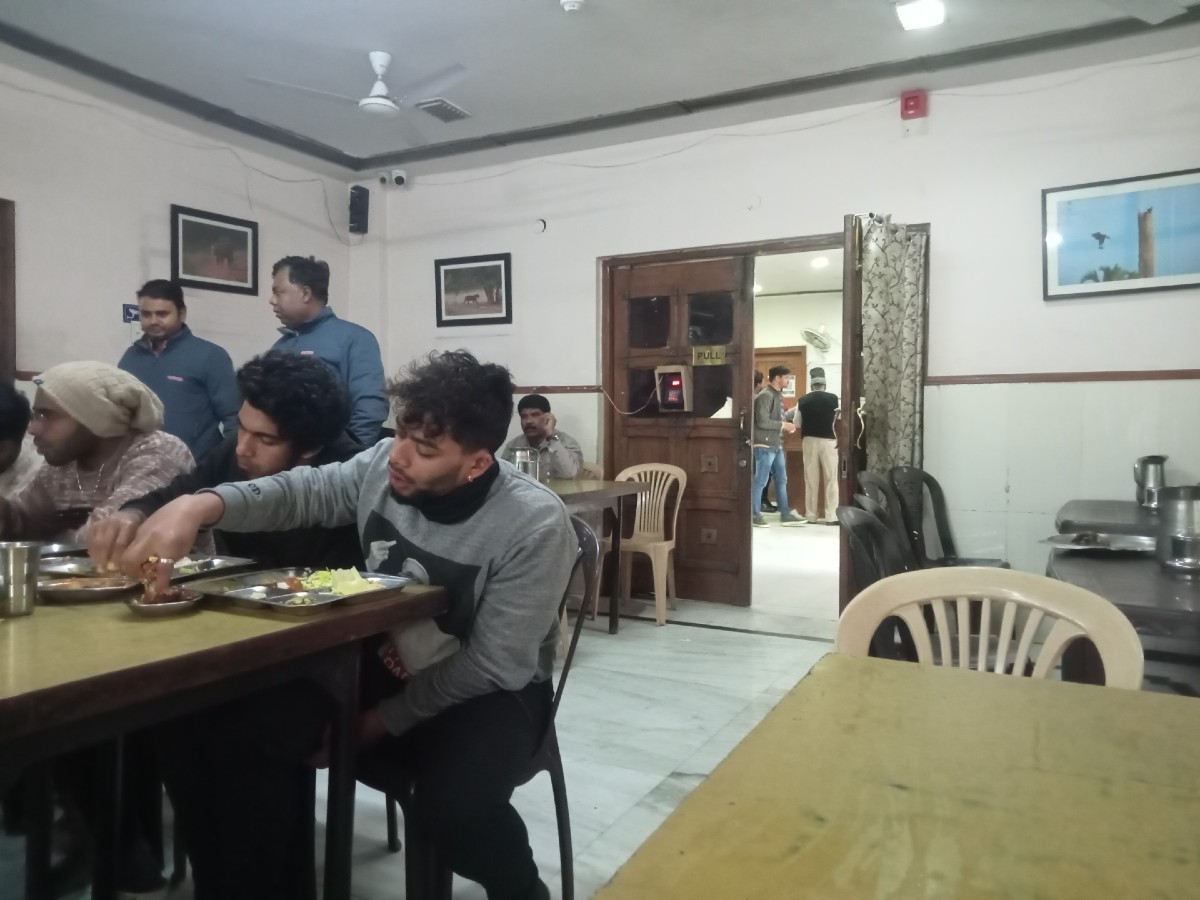
SAVOURING IT ALL: Visitors enjoying lunch at the canteen
As one enters the Samridhi canteen in Kerala House in Delhi, one is immersed in the saporous fragrance of spices, meat and coconut. The hustle-bustle of everyday activities in the canteen adds to the environment, giving it an ambience of a small eatery. The staff gives a welcoming nod to every visitor as they ask for the ‘token’ or receipt for the food ordered at the reception outside.
When Patriot visited the canteen, the speciality in the menu was fish biryani, which the receptionist informed was cooked as an experiment because the chef wanted to try something different. Apart from fish biryani, there was veg thali, dry fish, fried buffalo meat, fish curry and chicken biryani.
Affordable rates
The prices in the canteen are lower than those offered in most Malayali restaurants in the Capital. For example, the veg thali which contained sambar, thoran (dry vegetable dish such as raw banana and potato combined with coconut), chammanthipodi (dry coconut chutney), parippu curry (lentils), matta rice and papad, cost as less as Rs 80. Visitors in the canteen preferred the thali with dry fish or buffalo meat, which cost Rs 100 per plate. Whatever the meal, coconut reigned in every dish.
“Coconut is one of the most important ingredients in a Malayali household. While the veg thali here contained it as chutney, that we call chammanthipodi in Malayalam, it is also used without grinding, such as in dry meat,” says one of the visitors who came to the Kerala House especially for the food.
The red water, or karingalivellam (boiled water mixed with herbal medicinal plant), is served in place of normal water.
Satisfied by quality
Visitors from every region enjoyed the food. Many of them, especially Keralites, visited the canteen for the first time and were satisfied by the quality and quantity of the meal.
“The canteen is very famous in the Malayali community in Delhi. We are taking a tour of north India, and happened to stop in Delhi. The only place we can think of eating was Kerala House as suggested by our friends in the Capital,” a visitor explained.
One can ask for as many refills of lentils and vegetable dishes as one requires to satisfy the appetite.
Apart from local residents and tourists, government officials also have their lunch in the canteen. Assembly members and other politicians from Kerala who travel to New Delhi on business can stay at Kerala House. It comes under Kerala State Public Works Department. The Controller of Kerala House, who answers to the Honorable Resident Commissioner, is in charge of running the residence.
It is located just a few metres away from Jantar Mantar and its proximity to the site makes it popular among visitors in the area. While lunch mostly contains rice, dinner sees rice replaced with Malabari parathas, while appams (onion and coconut pancakes) are served in breakfast.
Malayali cook
“A lot of government officials and politicians visit the house so we have to maintain the quality of the food. Although the staff here is from north India as well as Kerala, it is a rule that food should be cooked only by a Malayali as he alone would know the best use of different regional spices and recipes,” says Mohan, a staff member of the Samridhi canteen.
“We receive as many as 300 visitors every day. Almost every meal that we offer in our menu is a local dish. Keralites love meat, so it is a must for buffalo meat or fish to be served in each menu,” says the chef of the canteen.
As Samridhi is a state-house canteen and not a restaurant, it’s a small functional place with seating capacity of just over 30 people. Sometimes, especially on weekends, visitors have to wait outside the canteen as there can be delays due to people thronging the place.
The canteen, among a few pocket-friendly restaurants in the city, serves as an abode for many Keralites who are residing in Delhi for work or studies.
Izza Ahsan, a Malayali student who did her bachelors degree from Jamia Millia Islamia, would visit the canteen with her Malayali friends once in a while.
“It is extremely difficult sometimes to eat the food that you are used to in Delhi. Local food does not only bring satisfaction to your appetite but also gives a sense of belonging and nostalgia. Sometimes, I would bring my north Indian friends to this place and they absolutely loved the food. It brings happiness when someone likes your local cuisines,” she said.
The canteen opens up for lunch at 12:30 pm every day and closes at about 3 pm. For dinner, it opens again at 7 pm till 9 pm. The breakfast starts from 8 am and ends at 10 am.
The canteen was also a topic of political controversy. In 2015, 20 police personnel had visited the canteen along with the Hindu Sena activists to check whether beef (cow meat) was being sold there or not. Following the commotion, buffalo meat was taken off the menu. The Kerala government complained to the police about violation of its rights after the ‘raid’.
The buffalo meat item returned to the menu after two days of the incident.
Delhi hosted what organisers describe as the world’s first player auction in golf, launching ‘72…
An elderly woman recalls how her six-year-old granddaughter lay bleeding after a speeding car hit…
Municipal Corporation of Delhi plans a unified policy enabling RWAs to adopt and maintain parks…
A 17-year-old boy allegedly died by suicide after jumping before a moving train at Uttam…
Delhi High Court grants bail to 26-year-old Thar driver accused of mowing down two in…
Two Rohini men arrested for fatally stabbing one person and injuring another during a robbery…